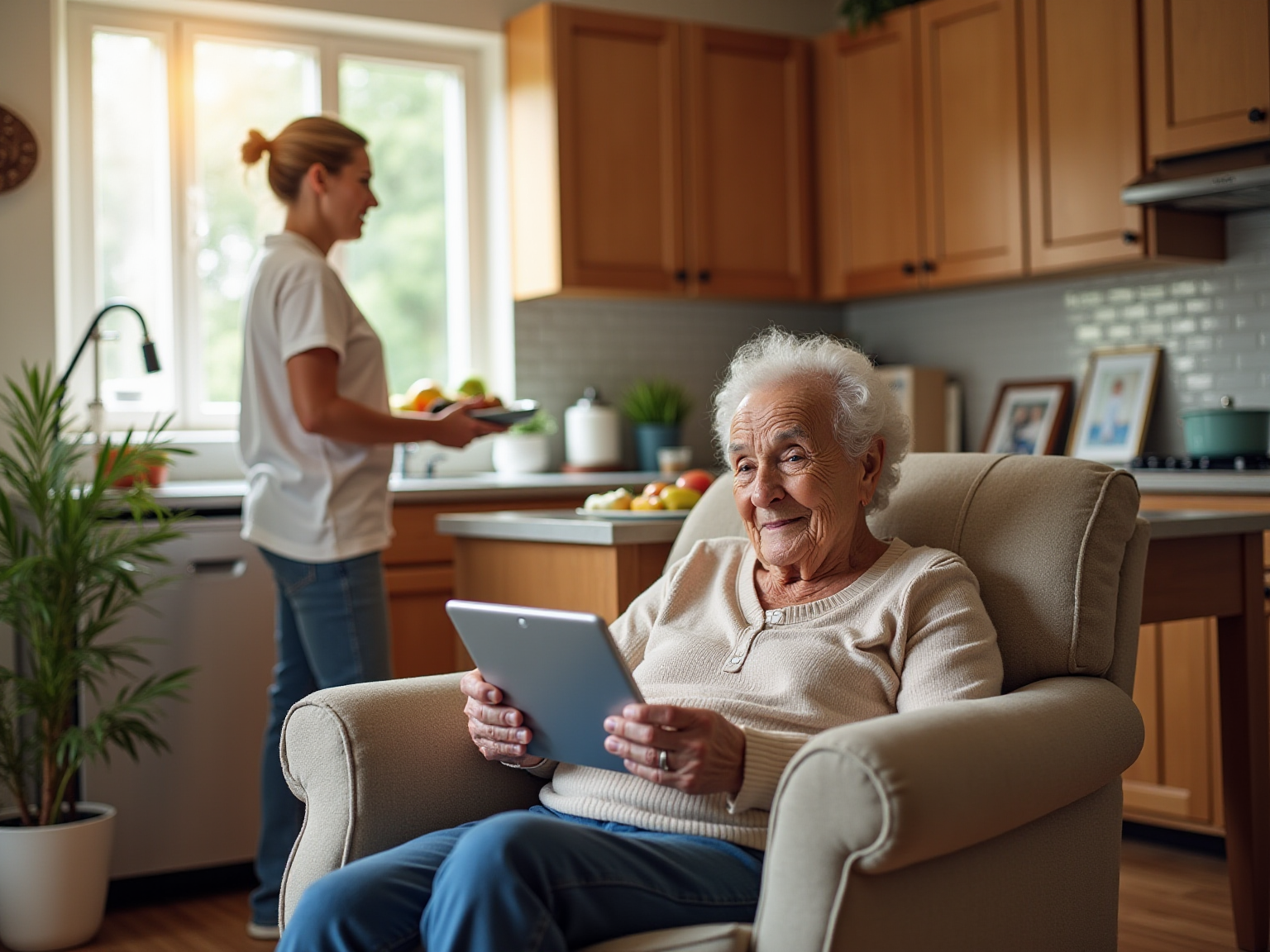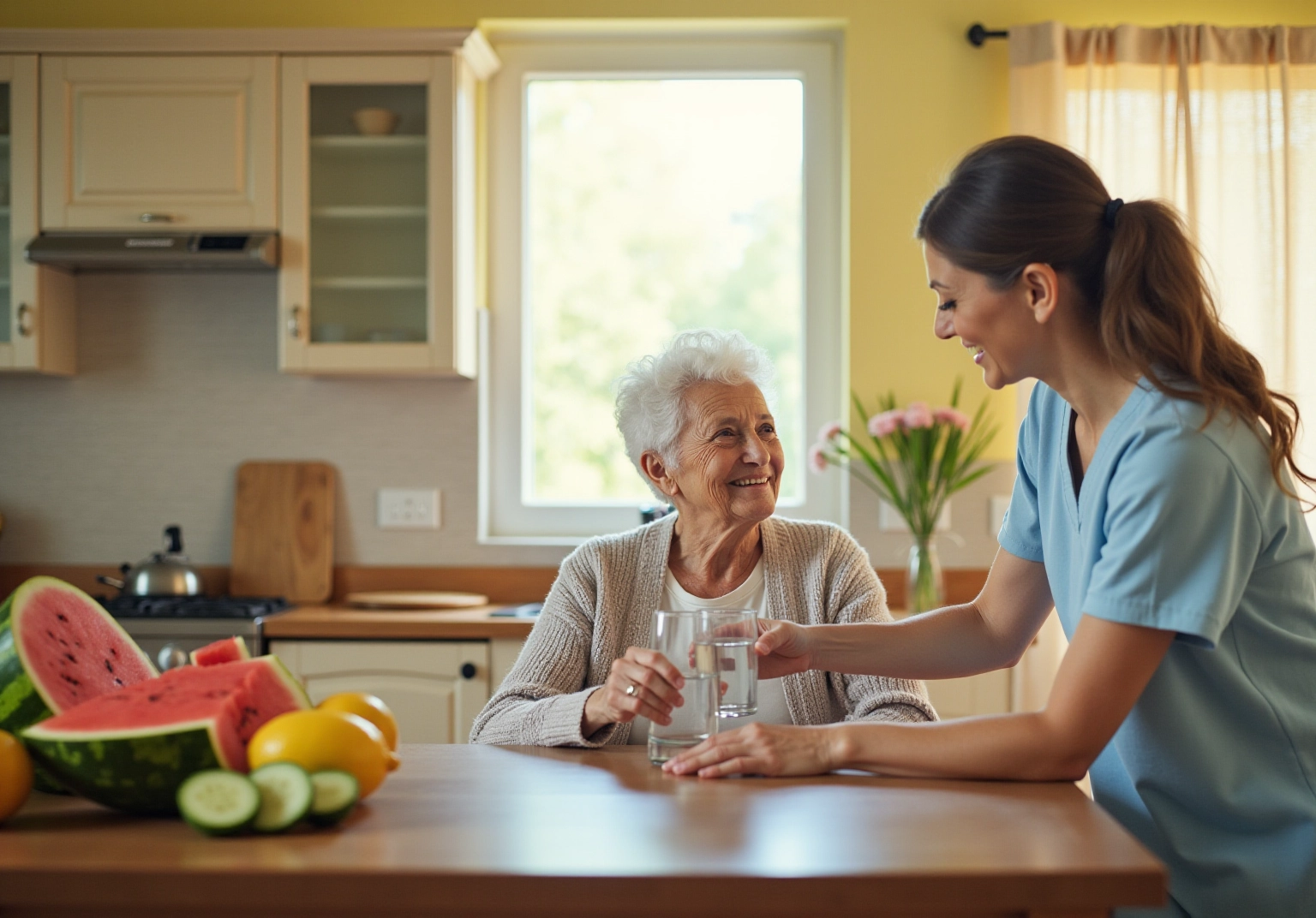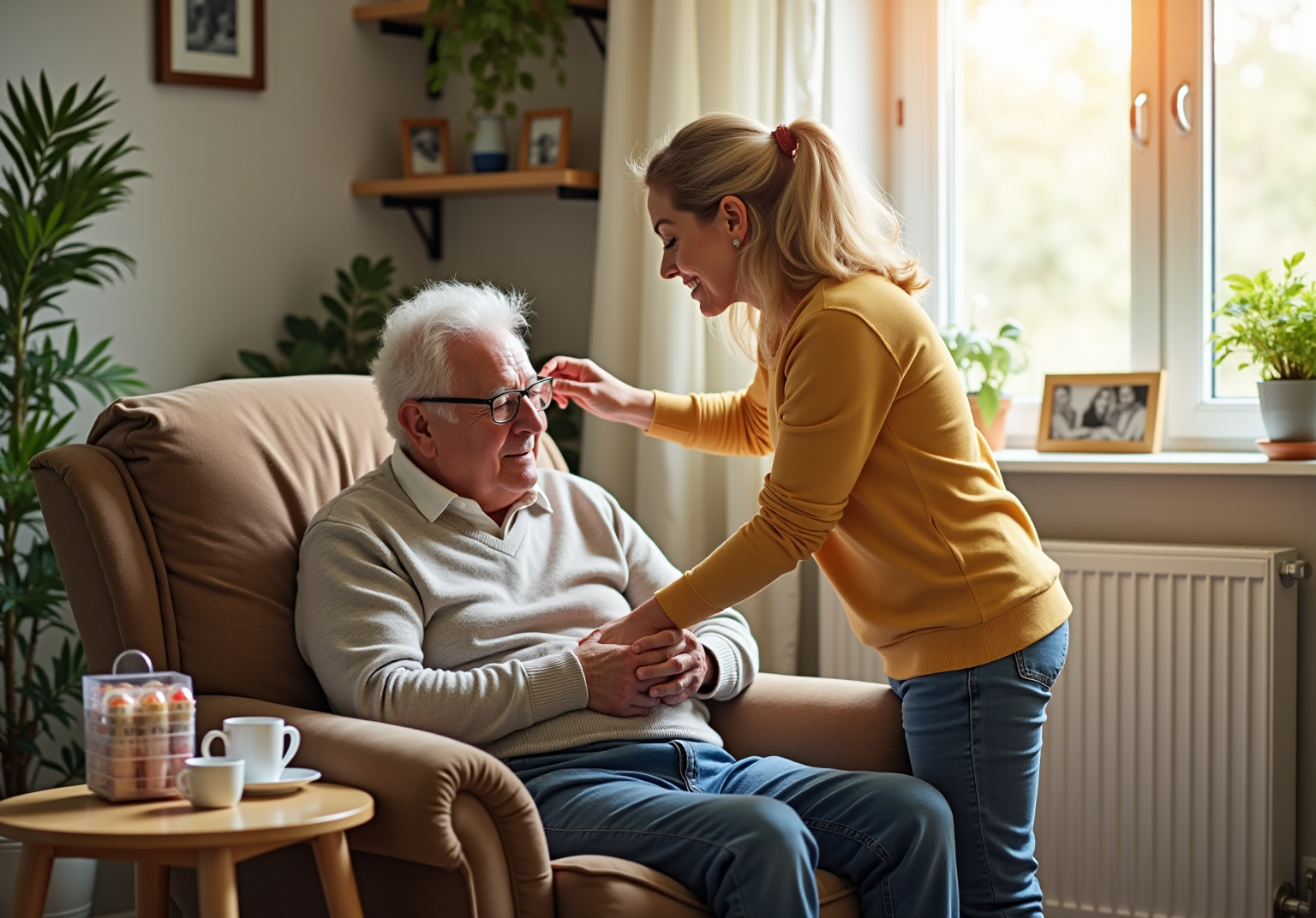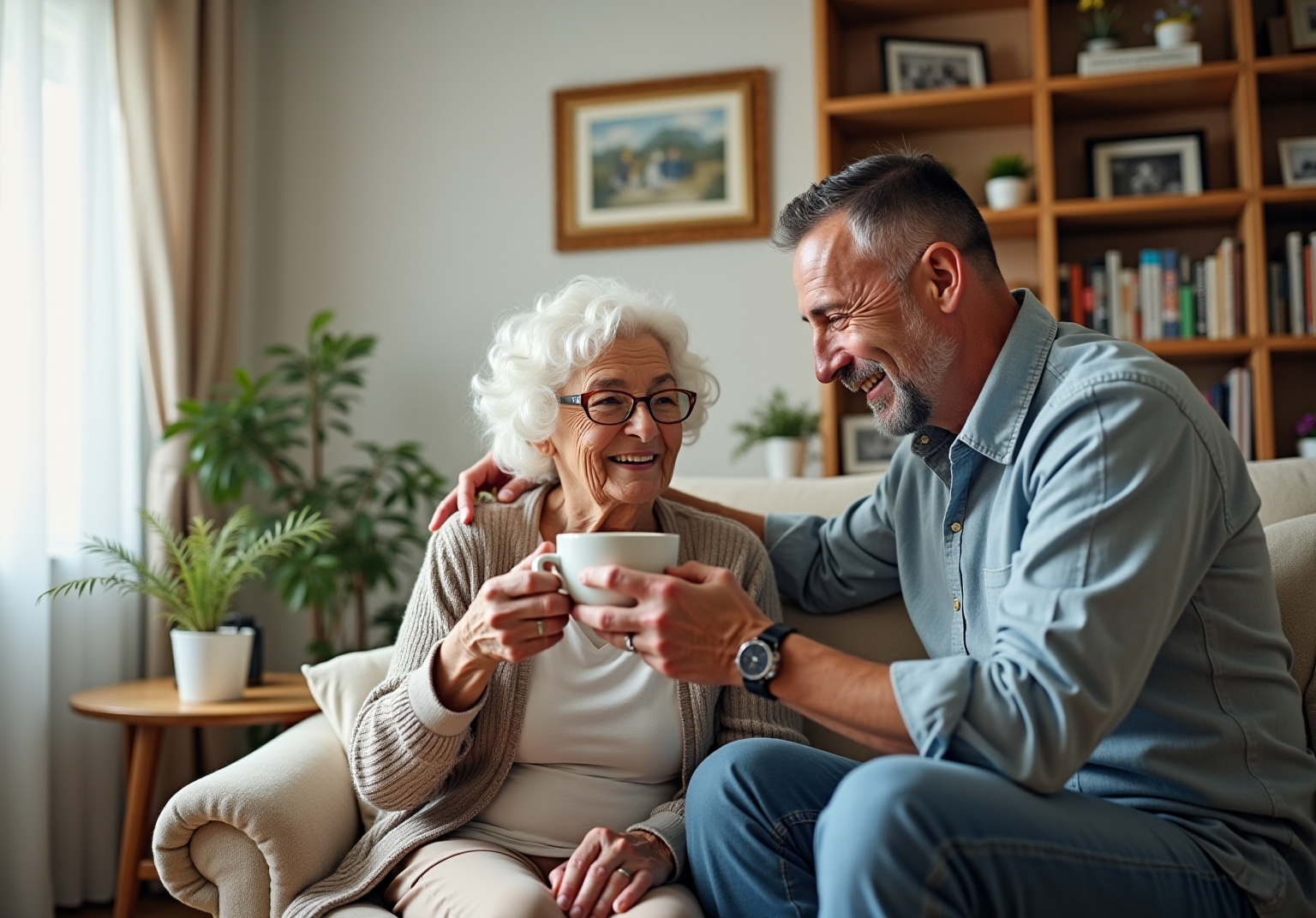Overview
The article highlights the essential role of creating personalized care plans and training caregivers in at-home senior care, all aimed at enhancing the well-being of elderly individuals. It acknowledges the importance of individualized support, which encompasses medical management, daily living assistance, and social engagement. Furthermore, well-trained caregivers who possess both essential skills and empathy are crucial for improving both the physical and emotional health of seniors.
By prioritizing these elements, we can foster a nurturing environment that truly addresses the unique needs of each elder. In addition, this tailored approach not only enhances their quality of life but also provides peace of mind for families. Your loved ones deserve the best, and we are here to ensure they receive the compassionate care they need.
Introduction
In an aging society where the demand for senior care is on the rise, the importance of personalized and effective caregiving cannot be overstated. Families often find themselves navigating the complexities of ensuring their loved ones receive the best possible support, and it’s essential to recognize the emotional weight of this responsibility. A multifaceted approach emerges as vital. Developing tailored care plans that address both medical and emotional needs, alongside selecting and training qualified caregivers who provide compassionate assistance, plays a crucial role in enhancing the quality of life for seniors.
Furthermore, the integration of technology into caregiving practices is revolutionizing the way care is delivered. Innovative solutions promote health, safety, and social connection, making it easier for families to stay engaged with their loved ones. This article explores key strategies that can transform senior care into a holistic, responsive, and enriching experience. We want to ensure that older adults not only receive the care they need but also thrive in their golden years. Remember, we’re here for you, and your comfort is our priority.
Develop Personalized Care Plans
Creating individualized support plans for seniors is essential in at-home senior care, beginning with a thorough evaluation that encompasses their medical history, daily routines, and personal preferences. This process becomes most effective when it includes family members and healthcare professionals, fostering a comprehensive approach to support in at-home senior care.
Key components of a personalized care plan include:
- Medical Management: Addressing chronic conditions, managing medications, and conducting regular health monitoring are crucial for ensuring optimal health outcomes. Without appropriate medical oversight, chronic conditions may deteriorate, leading to declines in well-being that could have been avoided.
At-home senior care offers daily living assistance, providing tailored support for essential activities such as bathing, dressing, and meal preparation. This support is vital for maintaining independence and dignity. Assistance with these tasks not only helps avoid hygiene issues and associated medical complications but also ensures that older adults receive adequate nutrition, which is essential for their overall well-being.
Incorporating elements that promote social engagement and emotional well-being—such as hobbies, nature therapy, and community involvement—can significantly enhance an older adult’s quality of life through at-home senior care. The companionship offered by caregivers can help reduce feelings of loneliness and depression, leading to improved mental well-being. Current patterns suggest that nature therapy through outdoor activities enhances mental wellness and social bonds for older adults, further supporting their overall health.
Indicators that suggest an elderly individual may require at-home senior care services include difficulty with personal hygiene, managing medications, or performing daily activities. By concentrating on these essential areas, those providing at-home senior care can develop strategies that not only meet medical requirements but also enhance the overall well-being of seniors, resulting in better health outcomes and a more fulfilling life.
Moreover, understanding that a professional provider is delivering high-quality support can reassure family members, allowing them to focus on their own responsibilities. As noted, “The bond between a supporter and the individual they assist is a testament to the power of love and human connection,” highlighting the emotional depth of personalized care. Additionally, the case study on Holistic Care Strategy Development demonstrates how a comprehensive approach can be effectively executed, ensuring that all aspects of an elder’s life are considered.
Select and Train Qualified Caregivers
Choosing qualified providers is a vital process that involves a comprehensive vetting procedure, including background checks, interviews, and reference evaluations. Once caregivers are selected, thorough training is crucial to equip them with the necessary skills tailored to the distinct requirements of older adults.
Key training areas include:
- Basic Care Skills: Caregivers receive training in personal care, mobility assistance, and medication management, ensuring they can provide fundamental support effectively. This training is essential, as it directly impacts the well-being and safety of older adults, helping to prevent issues such as wellness decline and mobility challenges.
- Communication Skills: Emphasis is placed on empathy, active listening, and effective communication, which are vital for building trust and rapport with older individuals and their families. This is particularly important considering that many elderly individuals experience feelings of isolation, and those providing assistance play a crucial role in offering emotional support and companionship.
- Specialized Training: Caregivers are educated on specific conditions such as dementia and chronic illnesses, enhancing their ability to address various medical challenges. This specialized knowledge is crucial for recognizing and managing the risks older adults face without proper assistance, such as poor nutrition and hygiene issues.
In addition to these training areas, it’s important to highlight the benefits of at-home senior care services, including their cost-effectiveness and convenience. Frequent training updates and workshops are essential for providers to stay informed about best practices and new techniques in elderly support. This continuous education is particularly vital, as one in three adults aged 50-80 express feelings of isolation. It underscores the necessity for caregivers to provide not only physical assistance but also emotional companionship.
Moreover, as the home assistance sector faces challenges such as workforce shortages and intricate regulations, investing in training for those providing support becomes increasingly essential. This investment ensures high-quality care and service for the elderly. At Best Care Nurses Registry, we are committed to providing well-trained caregivers who can offer the necessary emotional support and alleviate some of the burdens faced by families. Remember, your comfort is our priority, and we’re here for you.
Utilize Technology for Enhanced Care
Technology is truly transforming elder support, offering creative solutions that significantly enhance the quality of life for older individuals. Have you ever wondered how technology can make caregiving more effective? Here are several key ways to integrate technology into caregiving:
- Telehealth Services: Telemedicine allows for regular check-ups and consultations, minimizing the need for travel and ensuring elderly individuals receive timely medical advice. As of 2023, 80% of individuals in the U.S. have accessed care through telemedicine at least once, highlighting its growing importance in medical service provision.
- Monitoring Devices: Wearable gadgets that track vital signs can alert caregivers to concerning changes in well-being, enabling proactive interventions. These devices are essential in managing chronic conditions and ensuring prompt responses to bodily changes, all while maintaining a balance between infection protection and overall well-being.
- Medication Management Apps: Applications designed to remind older adults to take their medications on time help prevent missed doses, which is crucial for maintaining wellness and avoiding complications. This is particularly important, as missed or incorrectly administered medications can lead to adverse health effects.
- Communication Tools: Video calling platforms foster social connections with family and friends, which are vital for emotional well-being. Sustaining these relationships can greatly alleviate feelings of loneliness among older adults, addressing the emotional support that caregivers provide.
The financial and emotional strain on caregivers is considerable, with individuals in the U.S. providing nearly $350 billion in support to dementia patients in 2023. By embracing these technologies alongside personalized at-home senior care solutions from Best Care Nurses Registry, caregivers can offer more proactive and responsive assistance. This ultimately enhances the overall well-being of the elderly. The integration of technology not only streamlines caregiving processes but also empowers seniors to maintain their independence and quality of life, ensuring they receive the comprehensive support they truly need.
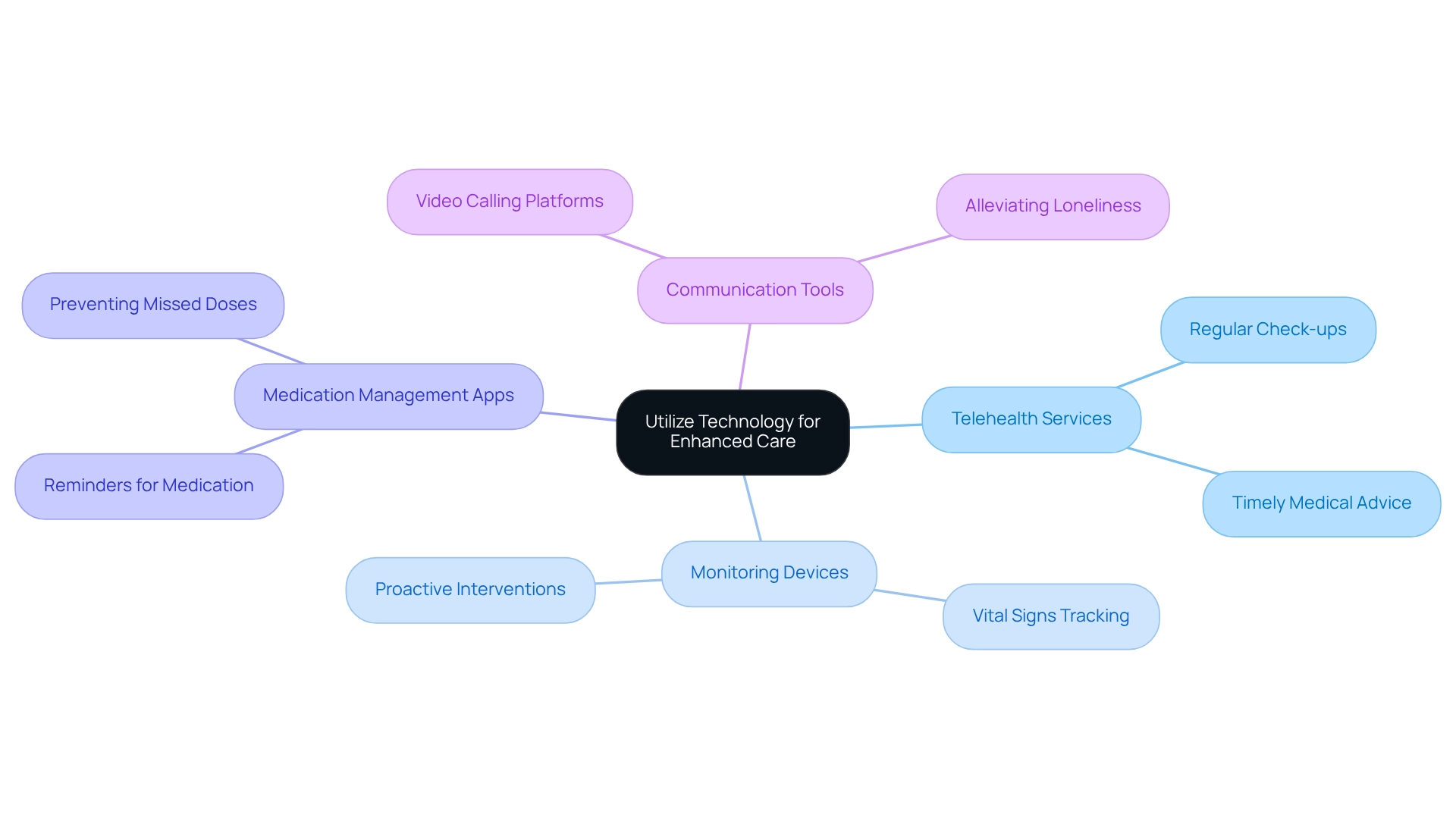
Conclusion
Personalized care plans are vital for enhancing the quality of life for seniors, as they address medical, emotional, and social needs. By involving family members and healthcare professionals in this process, caregivers can offer tailored support that nurtures independence and dignity. This approach also helps alleviate feelings of loneliness through companionship and engaging activities.
Equally important is the selection and training of qualified caregivers. By emphasizing core care skills, effective communication, and specialized training for conditions like dementia, caregivers are better prepared to meet the diverse needs of seniors. Continuous education ensures they can provide both physical care and emotional support, effectively combating isolation.
Moreover, integrating technology into caregiving is transforming how care is delivered. Telehealth services and health monitoring devices enhance the caregiving experience by facilitating regular consultations and offering real-time health insights. These innovations empower seniors to maintain their independence while staying connected with loved ones, ultimately leading to improved health outcomes.
In essence, adopting a comprehensive approach that encompasses personalized care plans, qualified caregivers, and technological integration is crucial for transforming senior care into a holistic experience. By prioritizing these elements, families can ensure their loved ones receive the necessary support to thrive during their golden years. This not only eases the emotional burden of caregiving but also demonstrates that compassionate care is within reach.
Frequently Asked Questions
Why are individualized support plans important for seniors in at-home care?
Individualized support plans are essential because they begin with a thorough evaluation of seniors’ medical history, daily routines, and personal preferences, ensuring a comprehensive approach to their care.
What key components should be included in a personalized care plan for seniors?
Key components include medical management (addressing chronic conditions, managing medications, and regular health monitoring), daily living assistance (support for activities like bathing, dressing, and meal preparation), and elements that promote social engagement and emotional well-being.
How does at-home senior care assist with daily living activities?
At-home senior care provides tailored support for essential activities such as bathing, dressing, and meal preparation, which helps maintain seniors’ independence and dignity while avoiding hygiene issues and ensuring adequate nutrition.
What role does social engagement play in the well-being of older adults?
Incorporating social engagement elements, such as hobbies, nature therapy, and community involvement, can significantly enhance the quality of life for older adults, reducing feelings of loneliness and depression and improving mental well-being.
What indicators suggest that an elderly individual may need at-home senior care services?
Indicators include difficulty with personal hygiene, managing medications, or performing daily activities, which may necessitate support from at-home senior care services.
How can family members feel reassured about the quality of care their loved ones receive?
Knowing that a professional provider is delivering high-quality support can reassure family members, allowing them to focus on their own responsibilities while ensuring their loved ones receive proper care.
What does the bond between a caregiver and an elderly individual signify in personalized care?
The bond signifies the emotional depth of personalized care, highlighting the power of love and human connection in supporting seniors.
What does the case study on Holistic Care Strategy Development demonstrate?
It demonstrates how a comprehensive approach to care can be effectively executed, ensuring that all aspects of an elder’s life are considered in their personalized care plan.

